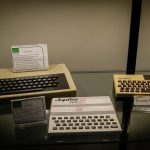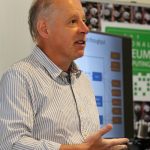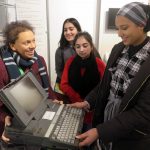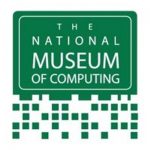To mark the 50th anniversary of The Open University (OU), a new display celebrating its early technology is open to visitors to The National Museum of Computing on Bletchley Park until 31 December 2019.
As pioneers in distance learning education, before personal computers were the norm and the internet became commonplace, the OU developed several innovative methods to enable its students to study on computers in their own homes. The exhibition offers a rare opportunity to see six of these machines It also presents an OU timeline, a video about the OU’s early computing and micro-electronics courses and an array of historic photographs of the OU’s computing since its foundation in 1969.
Launch talk at 2 pm on Friday, 27 September 2019
Twenty years of teaching computing and microelectronics at the Open University
John Naughton
Emeritus Professor of the Public Understanding of Technology, Open University, and journalist at The Observer
Tickets (free as part of museum entry)
Roger Moore, who worked on the OU Home Computing Policy Unit in the 1980s and in various OU educational software roles until 2015, highlights the significance of the OU’s computing education: “In 1972, Vice-Chancellor, Walter Perry, noted that the OU had turned out 2,000 students capable of writing non-trivial BASIC programmes. Now, 50 years on, there are probably more than one million OU graduates who have gone on to advance the development of computing and IT in this country.”
The display has been curated by Roger Moore, a TNMOC volunteer, with OU colleagues past and present. They have researched and brought together six of the early OU machines, including the Logic Tutor, MICRO 1, HEKTOR, OPUS and DESMOND, with some of the course software. Restoration of a HEKTOR is underway with the aim of giving visitors an opportunity for hands-on access to the early days of OU computing, and to program in Assembler or BASIC.
With three national computer centres – in Milton Keynes, London and Newcastle-upon-Tyne – the OU grew to have up to 275 study centres across the country with computer access to the centres. The HEKTORs also enabled some students access to the computer centres from home.
By the late 1980s, the computing landscape had been transformed by the affordability and wide availability of consumer desktop computers.
About The Open University
The Open University (OU) is the largest academic institution in the UK and a world leader in flexible distance learning. Celebrating its 50th anniversary in 2019, the university was founded with a clear purpose: to open up education to all. Since those beginnings in 1969, the OU has taught more than 2 million students worldwide and has over 170,000 current students, including more than 15,000 overseas.
Over 75% of students are in full-time or part-time employment, and three out of five FTSE 100 companies have sponsored staff to take OU courses.
In the latest assessment exercise for university research (Research Excellence Framework, 2014), nearly three quarters (72%) of OU research was assessed as 4 or 3 star – the highest ratings available, awarded to research that is world-leading or internationally excellent. The OU is unique among UK universities having both an access mission and demonstrating research excellence.
The OU has had a unique educational partnership with the BBC since 1971, collaborating on a range of content across TV, radio and digital channels/platforms. Each year the OU co-produces approximately 35 prime-time TV and radio series such as, Blue Planet II, The Prosecutors and Inside the Foreign Office. We achieved more than 351m viewing and listening events last year which prompted more than 1.6 million visits to our 17/18 broadcast related content on the OU’s free learning website, OpenLearn
Regarded as the UK’s major e-learning institution, the OU is a world leader in developing technology to increase access to education on a global scale. Its vast ‘open content portfolio’ includes free study units, as well as games, videos and academic articles, which have reached over 36 million people.
For further information please visit The Open University

















